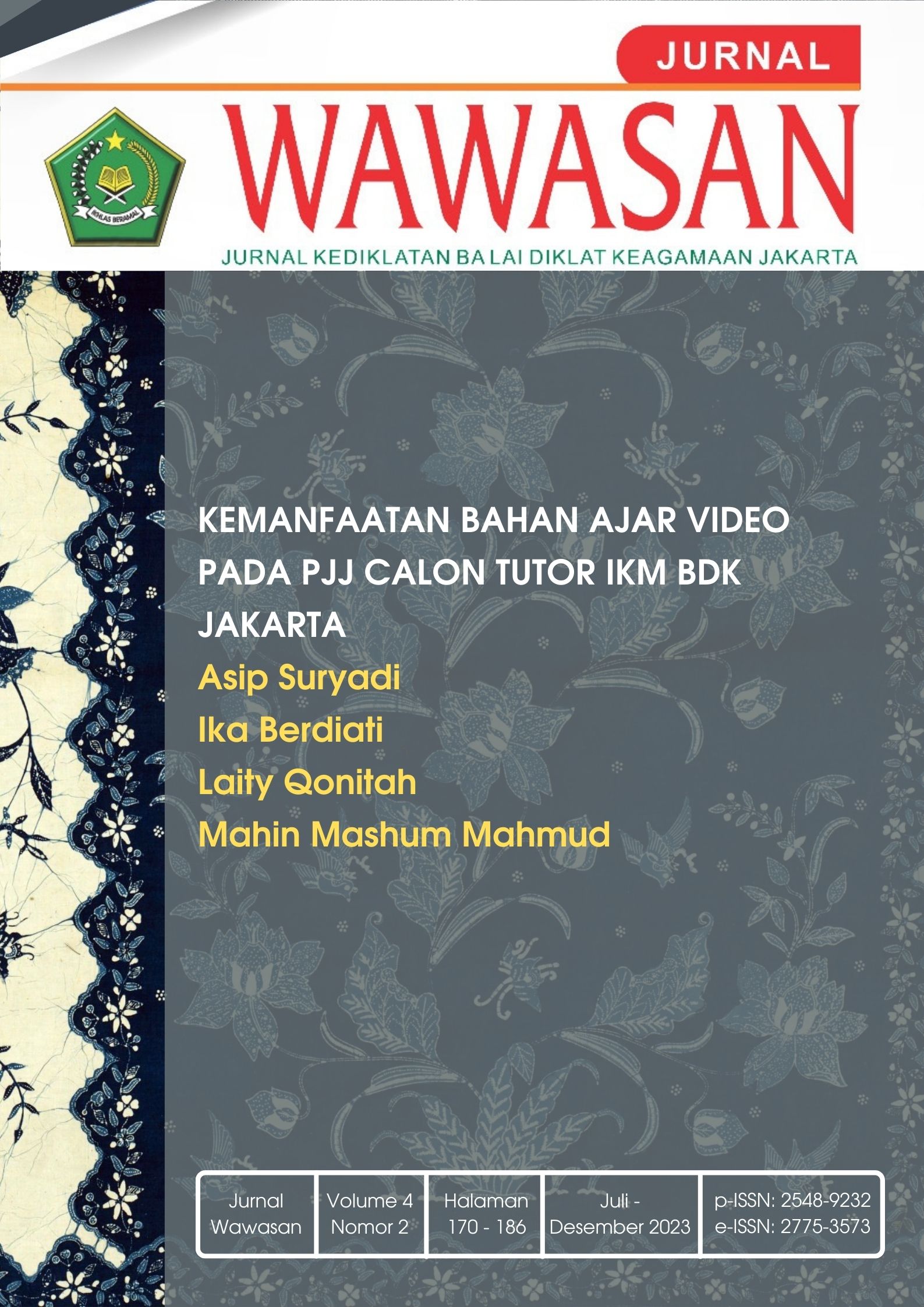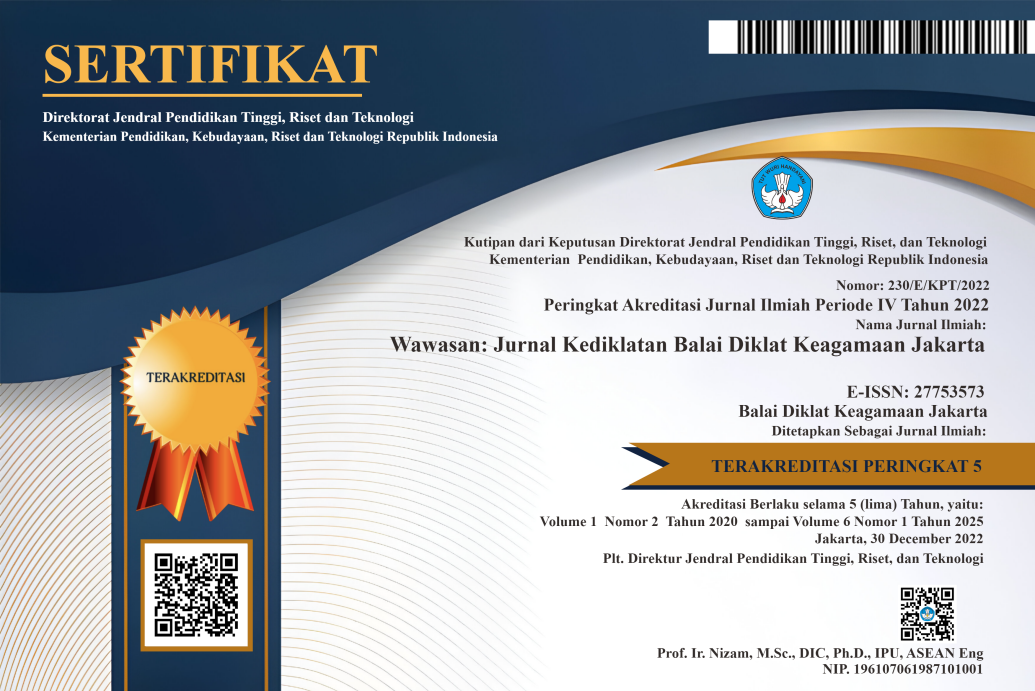KEMANFAATAN BAHAN AJAR VIDEO PADA PELATIHAN JARAK JAUH CALON TUTOR IKM BDK JAKARTA
DOI:
https://doi.org/10.53800/wawasan.v4i2.271Keywords:
bahan ajar video, kemanfaatan, kebutuhan peserta, BDK Jakarta, Pelatihan Jarak Jauh (PJJ)Abstract
Abstract
This study describes the level of provision of participants' expectations of video instruction in BDK Jakarta Distance Training (PJJ). The study uses a mixed method with an explanatory design model. The model consists of two steps. The first stage is quantitative data collection and the second is qualitative data collection. The first step used an online survey and the second used in-depth interviews. Quantitative data were processed to find patterns of answers which would be followed up with in-depth interviews. The population was 27 online classes of PJJ participants with 40 for each. They are teachers, headmasters and supervisors of Madrasah Ibtidaiyah (MI), Madrasah Tsanawiyah (MTs) and Madrasah Aliyah (MA) from Banten, DKI Jakarta and West Kalimantan. The online survey was conducted with all participants while in-depth interviews were conducted with a representative sample based on geography, positions (teacher, headmaster, supervisor) and education level (MI, MTs, MA). The research concludes that the number, information substance, duration and graphic aspect of video instruction in general, the respondents stated that it was sufficient, but many aspects still needed to be improved and adjusted. Because the research results confirm the high usefulness of video, it is recommended for training institutions to build on video instruction developers division so that the videos used meet the adequacy of quantity and quality.
Abstrak
Penelitian ini mendeskripsikan kemanfaatan dan tingkat pemenuhan harapan peserta terhadap bahan ajar video pada Pelatihan Jarak Jauh (PJJ) di BDK Jakarta. Metode yang digunakan adalah mix method pola explanatory sequential design. Populasi penelitian adalah alumni PJJ Calon Tutor IKM sebanyak 27 angkatan dengan masing-masing peserta setiap angkatan terdiri dari 40 guru, kepala madrasah dan pengawas dari tingkat Madrasah Ibtidaiyah (MI), Madrasah Tsanawiyah (MTs) dan Madrasah Aliyah (MA) di wilayah kerja BDK Jakarta yang terdiri dari provinsi Banten, DKI Jakarta dan Kalimantan Barat. Survei online dilakukan kepada seluruh peserta sedangkan in-depth interview dilakukan terhadap sampel representatif yang mewakili asal peserta, jabatan dan tingkat pendidikan (MI, MTs, MA). Penelitian menyimpulkan bahwa pada aspek jumlah, substansi informasi, durasi dan aspek grafis secara umum para responden menyatakan sudah memadai namun banyak aspek yang masih harus diperbaiki dan disesuaikan. Hasil penelitian merekomendasikan kepada lembaga pelatihan untuk meninjau kembali kebutuhan dan mutu video dan melembagakan pengembang bahan ajar video agar video yang digunakan memenuhi kecukupan jumlah dan mutunya.
Downloads
References
Andel, S., Vreede, T. De, Spector, P. E., & Padmanabhan, B. (2020). Do Social feature helps in video-centric online learning pltform? A Presence perspectives. Compjuters in HUman Behavior, July. https://doi.org/10.1016/j.chb.2020.106505
Aravindan. (2023). How to create an effective training video [5 easy steps]. Animaker. https://www.animaker.com/hub/how-to-create-an-effective-training-video/
Blink. (2022). Video Length: How Long Should a Course Video Be? UC Sandiego. https://blink.ucsd.edu/faculty/instruction/tech-guide/instructional-videos/best-practices/video-length.html
Bradbury, N. A. (2016). Attention span during lectures: 8 seconds, 10 minutes, or more? Advances in Physiology Education, 40(4), 509–513. https://doi.org/10.1152/advan.00109.2016
CNN. (2023). Youtube Masih Raja Media Sosial di Indonesia, FB dan IG Menyusul. CNN. https://www.cnnindonesia.com/teknologi/20230516074927-192-950065/youtube-masih-raja-media-sosial-di-indonesia-fb-dan-ig-menyusul
Creswell, J. W., & Creswell, J. D. (2018). Research Design Qualitatif, Quantitatif, and Mixed Methods Aproach Fifth Edition. In Sage Publication (5th ed.). Sage. https://doi.org/10.1017/CBO9781107415324.004
Ferguson, S. (2023). How to Create Training Videos in 2023: Complete Guide. Wyzowl. https://www.wyzowl.com/create-training-videos/
Fishman, E. (2023). Optimal Video Length: How Long Should A Marketing Video Be? Wistia. https://wistia.com/learn/marketing/optimal-video-length
Fyfield, M., Henderson, M., & Phillips, M. (2019). 25 Principles for effective instructional video design. ASCILITE 2019 - Conference Proceedings - 36th International Conference of Innovation, Practice and Research in the Use of Educational Technologies in Tertiary Education: Personalised Learning. Diverse Goals. One Heart., 418–423. https://doi.org/10.14742/apubs.2019.299
Gupta, P., & Rao, S. (2021). Effectiveness of Video-Based Online Training for Health Care Workers to Prevent COVID-19 Infection : An Experience at a Tertiary Care Level. 13(5), 1–11. https://doi.org/10.7759/cureus.14785
Jin, S.-H., Im, K., Yoo, M., Roll, I., & Seo, K. (2023). Supporting students’ self-regulated learning in online learning using artificial intelligence applications. International Journal of Educational Technology in Higher Education, 20(1). https://doi.org/10.1186/s41239-023-00406-5
Kaltuta. (2022). The State of Video in Education 2022 Global Insights and Trends.
Knigge, M., Krauskopf, K., & Wagner, S. (2019). Improving Socio-Emotional Competencies Using a Staged Video-Based Learning Program ? Results of Two Experimental Studies. Frontiers in Education, 4(December), 1–12. https://doi.org/10.3389/feduc.2019.00142
Knowles, M. S. (1975). Self Directed Learning A Guide for Learner and Teacher. Follett Publishing Company.
Knowles, M. S., Iii, E. F. H., & Swanson, R. A. (2005). The Adult Learner: The Definitif CLass in Adult Education and Human Resources Development (The Sixth). Elsevier.
Köster, J. (2018). Video in the age of digital learning. In Video in the Age of Digital Learning. https://doi.org/10.1007/978-3-319-93937-7
Murairwa, S. (2015). Issn : 2278-6236 Issn : 2278-6236. International Journal of Advanced Research in Management and Social Sciences, 4(2), 185–195.
P., D., & Rudd. (n.d.). The value of video in online instruction. JOurnal of Instructional Pedagogies, 1–7.
Ramlatchan, M., & Watson, G. S. (2020). Enhancing instructor credibility and immediacy in online multimedia designs. 511–528.
Shewale, R. (2023). YouTube Statistics For 2023 (Demographics & Usage). Demandsage. https://www.demandsage.com/youtube-stats/
Sweller, J., Van Merriënboer, J. J. G., & Paas, F. (2011). Intrinsic cognitive load. In Cognitive load theory.
Syaripuddin, R., Ahmad, A. R., & Awang, M. M. (2019). The Use of Video in Teaching and Learning 21 st Century History Education in Malaysia. Social Sciences, Education and Humanities, 2, 182–186.
Taspolat, M., Kaya, A. S., Sapanca, S., & Beheshti, S. (2018). Characteristics of instructional videos. World Journal on Educational Technology: Current Issues, 10(2), 79–87. www.wj-et.eu
Techsmith. (2023). Video Length: How Long Should Instructional Videos Be? (New Data). Techsmith. https://www.techsmith.com/blog/video-length/
Ubaidillah, N. (2023). Youtube, 5 Aplikasi Streaming Video Gratisan Selain. Artikel. https://www.pricebook.co.id/article/game_apps/8320/situs-streaming-video-selain-youtube

Published
Issue
Section
License
Copyright (c) 2023 Wawasan: Jurnal Kediklatan Balai Diklat Keagamaan Jakarta

This work is licensed under a Creative Commons Attribution-ShareAlike 4.0 International License.

















